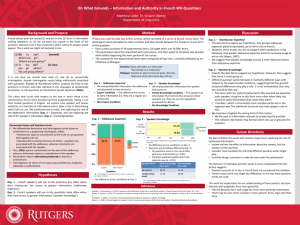Loder, Matthew: On What Grounds – Information and Authority in French Wh-Questions
Title: On What Grounds – Information and Authority in French Wh-Questions
Name: Matthew Loder
Major: Linguistics
School affiliation: School of Arts and Sciences
Programs: Honors College Capstone
Other contributors: Viviane Déprez
Abstract: The fact that French allows both the moved and the in-situ question form in information seeking wh-questions raises issues for several mainstream approaches to the syntax of questions. These approaches center on languages like English, where fronting of the question word is required, or Mandarin, where fronting does not occur, and tend to hold that languages vary parametrically between these two options. This paper considers a proposal by Bobaljik & Wurmbrand (2015), treating in-situ questions in French and other optional in-situ languages as syntactically declarative (statements). This raises new issues with respect to the way in which these in-situ constructions derive their questioning force pragmatically. Taking a cue from the usage of biased polar questions such as `It’s raining out?’ we explore how speaker and hearer authority, as a function of information access, plays a role in determining which form to use. We conducted two surveys, one exploring the role of the addressee’s information (Exp. 1 – Expertise), and one exploring the role of the speaker’s information (Exp. 2 – Knowledgeability). We found that neither the addressee nor the speaker’s information appeared to have a significant effect. In Exp. 2 we observed that the wh-words ‘où’ (where) and ‘combien’ (how much) behaved in opposite ways with respect to speaker information. We suggest that this may be due to structural differences between these particular question words. We also note that while we manipulated access to information about the possible answers to the questions, another kind of information (about the event or context of the question) may be relevant to the use of in-situ. We discuss the possibility of running a follow-up study designed to more precisely determine the effects of different kinds of relevant information on the choice of question form.
